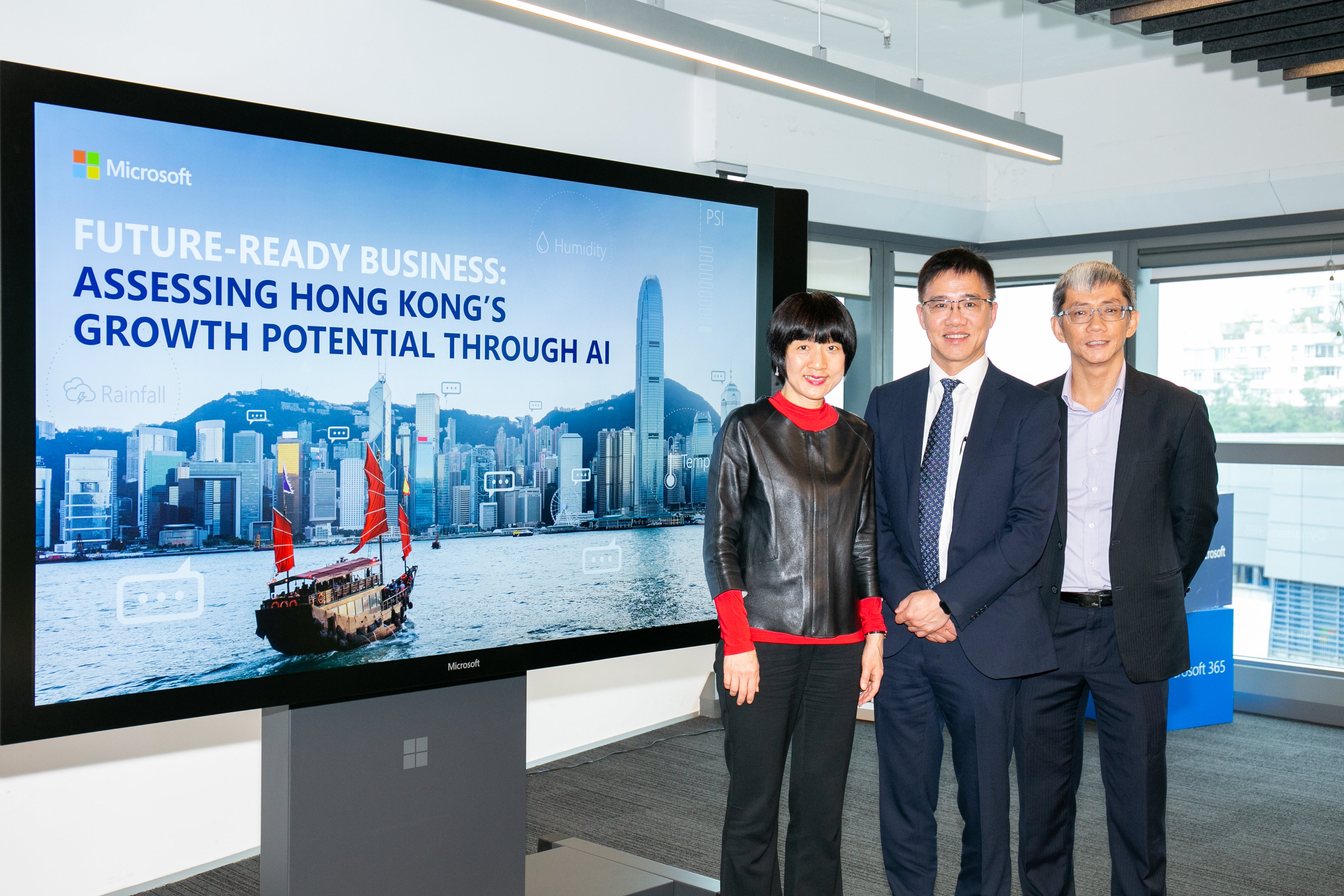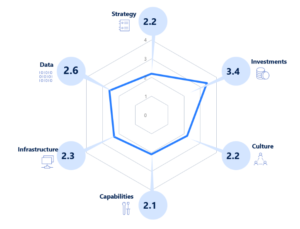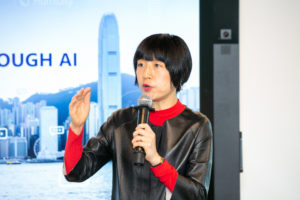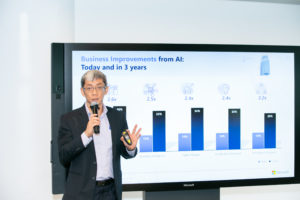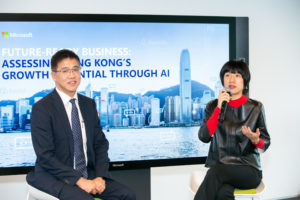- Artificial Intelligence (AI) will more than double the rate of innovation and employee productivity gains in Hong Kong by 2021.
- As Hong Kong progresses on the digital transformation journey, 40% of organizations in Hong Kong today have embarked on their AI journeys, similar to the Asia Pacific situation.
- Culture and Skills are among key barriers for organizations to succeed in AI.
- Hong Kong organizations need to focus on improving its AI readiness, especially in culture dimension, to ensure the success of the city’s AI journey.
Hong Kong, May 8 2019 – By 2021, Artificial Intelligence (AI) will allow the rate of innovation and employee productivity improvements in Hong Kong to more than double (X2.3 times respectively), according to business leaders in Hong Kong. The study from Microsoft and IDC Asia/Pacific, Future Ready Business: Assessing Asia Pacific’s Growth Potential Through AI[1] surveyed 100 business management and 101 workers in Hong Kong.
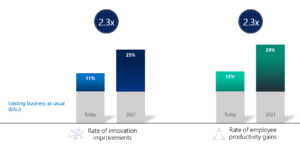 Fig 1: AI impact on rates of innovation and employee productivity improvements today and in three years
Fig 1: AI impact on rates of innovation and employee productivity improvements today and in three years
With 74% of the management level respondents polled agreed that AI is instrumental for their organization’s competitiveness, 40% of organizations in Hong Kong have already embarked on their AI journeys. Those companies that have adopted AI expect it to increase their competitiveness by 2.6 times in 2021.
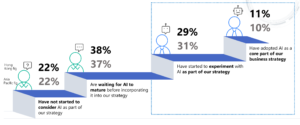 Fig 2: Ratio of Hong Kong organizations which are already embarking on AI journeys.
Fig 2: Ratio of Hong Kong organizations which are already embarking on AI journeys.
“Today, every company is a software company, and increasingly, every interaction is digital. To be successful in this new world, organizations need to be a fast adopter of best-in-class technology; and secondly, they need to build their own unique digital capabilities,” said Cally Chan, General Manager of Microsoft Hong Kong and Macau. “AI is the defining technology of our time that significantly accelerates business transformation, enables innovation, boosts employee productivity, and ensures further growth. Economies and businesses that have yet to embark on their AI journey run a real risk of missing out on the competitive benefits that are enjoyed by leaders.”
Why adopt AI?
For the organizations that have implemented AI initiatives, the top five business drivers to adopt the technology were (in priority order): Higher margins (30% of respondents named it as the number one driver); higher competitiveness (28%); accelerated innovation (13%); more productive employees (13%) as well as business intelligence (8%).
Victor Lim, Vice President, Customer Research and Consulting Operations, IDC Asia/Pacific said: “Last year, organizations that have adopted AI saw tangible improvements in those areas in the range of 13% to 14%. They forecast further improvements of at least 2.2 times in the three-year horizon, with the biggest jump expected in higher competitiveness and business intelligence.”
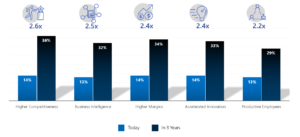 Fig 3: AI improves business today and in three years
Fig 3: AI improves business today and in three years
Hong Kong needs to build on AI culture
The study evaluated six dimensions critical to ensuring the success of a nation’s AI journey. It uncovered that Hong Kong needs to focus on improving on all areas, particularly its culture in order to accelerate its AI journey.
Fig 4: AI Readiness in Hong Kong (Scale of 0.00 – 4.00)
Hong Kong is not ready yet for AI. To succeed in AI race, Hong Kong needs to substantially improve its readiness. Organizations’ management should make AI a core part of their strategy and develop a learning agility culture. They have to continuously invest in this transformative technology for the long-term success, sometimes without immediate returns,” Lim said. “There is an urgent need for talents and tools to develop, deploy and monitor AI models, along with the availability of a robust data estate with the adequate governance.”
Management level respondents who are adopting AI face three top challenges a lack of skills, resources and continuous learning programs; lack of thought leadership and leadership commitment to invest in AI; and lack of advanced analytics or adequate infrastructure and tools to develop actionable insights.
The study showed that to move ahead on their AI journeys, businesses have to create the right organizational culture. A significant proportion of business leaders and majority of workers surveyed believe that cultural traits that support AI journeys, such as risk-taking, proactive innovation, as well as cross-function partnerships among teams, are not pervasive today. “Overall, workers in Hong Kong are more skeptical than the management about the cultural readiness of their organizations,” added Lim.
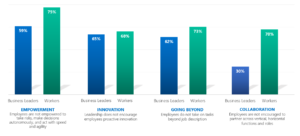 Fig 5: Cultural Traits in an Organization to Support AI Journeys
Fig 5: Cultural Traits in an Organization to Support AI Journeys
“Management level must now embrace a new culture, where innovation and continuous learning are core components of the organizational culture. It sets the stage for agility, adaptability and growth,” said Chan.
Organizations need to address skills challenge for an AI-enabled workforce
The study found that Hong Kong business leaders and workers hold positive viewpoints about the AI’s impact on the future of jobs. More than half (58% of business leaders and 68% of workers) believe that AI will either help to do their existing jobs better or reduce repetitive tasks.
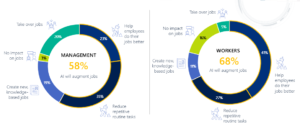 Fig 6: Perception of AI’s impact on jobs (Management and Workers)
Fig 6: Perception of AI’s impact on jobs (Management and Workers)
“When it comes to augmentation of jobs, workers are more optimistic with 41% of them believe AI will help them to do their jobs better and 27% agree that AI will reduce repetitive routine tasks,” said Lim.
The study also found that workers are more willing to reskill than business leaders believe they are. 27% of management felt that workers have no interest to develop new skills, whereas only 17% of workers are not interested.
“Microsoft’s vision for AI is first and foremost about people. AI technology cannot progress without them. This means that millions will need to transform themselves into skilled workers as well as learners that an AI future needs,” said Chan. “It is heartening to see that 87% of businesses prioritize skilling and reskilling of workers in the future. They plan to invest as much, or even more, in human capital than in new technology. Even so, 73% of business leaders have yet to implement plans to help their employees’ to acquire the right skills, which is worrying in today’s context. They must have the urgency to support the fundamental shift in training workers for the future.”
“The jobs of today will not be the jobs of tomorrow, and we have already seen demand for software engineering roles expand rapidly beyond just the tech sector. However, building an AI-ready workforce does not necessarily mean an acute need for technological skills,” added Chan.
The top three future skills required by management level respondents in Hong Kong include adaptability and continuous learning mindset, digital skills and analytical skills. The demand for these skills is higher than the existing supply for the first two identified skills.
The study also uncovered that management level respondents value soft skills more than workers expect. The biggest skills gaps identified were in:
- Digital skills (11-pt difference between business leaders and workers)
- Adaptability and continuous learning (9-pt difference between business leaders and workers)
- Analytical skills (6-pt difference between business leaders and workers)
AI Leaders: Robust strategy, capabilities and skills provide an edge
The study identified 6% of organizations which are AI Leaders in Asia Pacific. These organizations have already incorporated AI into their core business strategy and nearly doubled their business benefits today as compared to other organizations. Compared to the rest of the organizations in Asia Pacific:
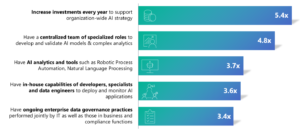 Fig 7: Traits of an AI Leader against Followers
Fig 7: Traits of an AI Leader against Followers
For more information, visit https://news.microsoft.com/apac/features/artificial-intelligence/
[1] About the study Future Ready Business: Assessing Asia’s Growth Potential Through AI
- 1,605 business leaders and 1,585 workers participated in this study, including 100 business leaders and 101 workers in Hong Kong.
- Business leaders: Business and IT leaders from organizations with more than 250 staff were polled. Respondents were decision makers involved in shaping their organization’s business and digital strategy.
- Workers: Respondents screened have understanding of Artificial Intelligence today, and do not play a role in decision making process within their organization.
- 15 Asia Pacific markets were involved: Australia, China, Hong Kong, Indonesia, India, Japan, Korea, Malaysia, New Zealand, Philippines, Singapore, Sri Lanka, Taiwan, Thailand and Vietnam.
- Industries polled included agriculture, automotive, education, financial services, government, healthcare, manufacturing, retail, services and telco/media.
###
About Microsoft
Microsoft (Nasdaq “MSFT” @microsoft) is the leading platform and productivity company for the mobile-first, cloud-first world, and its mission is to empower every person and every organization on the planet to achieve more.
Cally Chan, General Manager of Microsoft Hong Kong and Macau, points out that Artificial Intelligence (AI) would more than double the rate of innovation and employee productivity gains in Hong Kong by 2021.
Victor Lim, Vice President, Customer Research and Consulting Operations, IDC Asia/Pacific mentions that organizations forecasted AI adoption bringing tangible business improvements of at least 2.2 times in the three-year horizon, with the biggest jump expected in higher competitiveness and business intelligence.
Ted Suen, Chief Information Officer, MTR Corporation (left) shares how MTR Corporation built AI culture in the organization by organizing internal AI Hackathon for employees.

